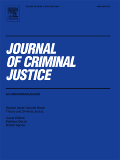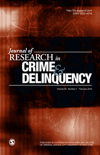
CRIMINAL JUSTICE STUDIES
Scope & Guideline
Transforming theory into practice in criminal justice.
Introduction
Aims and Scopes
- Interdisciplinary Research:
The journal emphasizes interdisciplinary approaches, drawing from sociology, psychology, criminology, and law to offer diverse perspectives on criminal justice issues. - Impact of Social Factors:
A consistent focus on how social factors such as race, gender, and socioeconomic status influence crime, victimization, and justice system responses. - Organizational Justice and Staff Well-being:
Research exploring organizational dynamics within correctional facilities, emphasizing staff perceptions of justice, job satisfaction, and mental health outcomes. - Restorative and Procedural Justice:
Investigation into restorative justice practices and procedural justice principles, aiming to enhance understanding of victim-offender relationships and community trust in the justice system. - Cybercrime and Technological Advances:
A growing area of focus on the implications of technology in crime, including cybercrime, digital victimization, and the evolving nature of law enforcement in a digital age. - Youth and Delinquency:
The journal pays particular attention to issues surrounding youth crime, delinquency, and the factors influencing juvenile justice, including peer influence and family dynamics.
Trending and Emerging
- Mental Health and Criminal Justice:
A significant trend towards exploring the intersection of mental health and criminal justice, particularly in relation to correctional staff and justice-involved individuals, indicating a growing recognition of the importance of mental health support. - Cybercrime and Digital Justice:
Emerging research on cybercrime reflects the increasing prevalence of digital offenses and the need for updated legal frameworks and law enforcement strategies in the digital age. - Restorative Justice Practices:
An increased focus on restorative justice practices, emphasizing healing for victims and accountability for offenders, is becoming more prominent as scholars advocate for alternative approaches to traditional punitive systems. - Diversity and Inclusion in Criminal Justice:
Research addressing diversity issues, including LGBTQ+ experiences and racial disparities within the justice system, is gaining traction, reflecting a broader societal push for inclusivity and equity. - Impact of Organizational Culture on Justice Outcomes:
A growing interest in how organizational culture influences the experiences and outcomes of correctional staff and justice-involved individuals, highlighting the importance of workplace dynamics in the justice system.
Declining or Waning
- Traditional Crime Control Measures:
There is a noticeable decline in research focusing on traditional punitive measures and their effectiveness, as the field shifts towards rehabilitation and restorative practices. - Public Perception Studies:
While still relevant, studies solely focused on public perception of police and crime have decreased, suggesting a movement towards more nuanced investigations that incorporate community engagement and procedural justice. - Gendered Crime Analysis:
Although gender remains a critical aspect of criminal justice studies, specific analyses of gendered crime narratives have become less prominent, possibly overshadowed by broader discussions of intersectionality. - Victimology as a Standalone Field:
Research solely centered on victimology without integration into broader criminal justice discussions appears to be waning, as the focus shifts towards victim-offender interactions and restorative justice approaches.
Similar Journals

Trends and Issues in Crime and Criminal Justice
Connecting research to real-world justice challenges.Trends and Issues in Crime and Criminal Justice is a leading journal in the field of criminology, published by the Australian Institute of Criminology. This esteemed journal, recognized with an H-index that reflects its influence and contribution to the social sciences, particularly law, spans from 2011 to 2024 and is ranked in the Q1 category within its discipline according to the 2023 data. With a Scopus ranking of #123 out of 1025 in the Social Sciences - Law category, placing it in the 88th percentile, it serves as a critical resource for researchers, practitioners, and students alike.
Focused on innovative research and emerging issues within crime and criminal justice, the journal seeks to foster scholarly collaboration and discourse, making it an essential hub for new ideas and evidence-based practices in the field. The journal’s commitment to advancing knowledge and influencing policy ensures that it remains an influential voice in criminological studies, aiming to address pressing issues facing societies globally.

Criminal Law Forum
Bridging theory and practice in criminal law scholarship.Criminal Law Forum, published by Springer, is a distinguished journal that serves as a critical platform for scholarly discourse in the field of criminal law. With an ISSN of 1046-8374 and E-ISSN 1572-9850, this journal has been contributing to the legal community since its inception, with a publication span that includes significant periods such as 1989 to 1997, and from 1999 to 2024. Positioned in the Q3 quartile of the Law category and ranked 491 out of 1025 in the Scopus database, Criminal Law Forum showcases innovative research, theoretical insights, and empirical studies that assist professionals, researchers, and students in dissection and comprehension of contemporary legal issues. Though it does not operate on an open-access model, the journal is accessible to subscribers and academic institutions, furthering its reach within the legal academia. By fostering a robust exchange of ideas and encouraging interdisciplinary approaches, Criminal Law Forum continues to enhance the understanding of criminal law, making it an essential resource for those engaged in legal scholarship.

PSYCHOLOGY CRIME & LAW
Unraveling the Complexities of Human Behavior in Legal ContextsPSYCHOLOGY CRIME & LAW, published by Routledge Journals, Taylor & Francis Ltd, is a premier academic journal dedicated to the intersection of psychology, criminology, and the law. With an ISSN of 1068-316X and an E-ISSN of 1477-2744, this journal provides a critical platform for the dissemination of cutting-edge research and innovative methodologies in the fields of psychology, forensic medicine, and legal studies. Spanning over three decades (1994 to 2024), it holds impressive Scopus rankings, placing it in Q1 and Q2 quartiles for its contributions to law and forensic medicine, highlighting its standing within the academic community. PSYCHOLOGY CRIME & LAW is particularly noted for addressing contemporary issues at the crossroads of human behavior and legal standards, making it essential reading for scholars, practitioners, and students alike. While the journal is not open access, it offers valuable insights into a variety of topics, from criminal psychology to the implications of mental health in legal contexts, ensuring that it remains an influential resource for those engaged in research and professional practice.

Revista Criminalidad
Unveiling Insights into Criminal BehaviorRevista Criminalidad, published by POLICIA NAC COLOMBIA, is a distinguished academic journal that has been open access since 1958, making critical research in the field of criminology readily available to the global scholarly community. Based in Colombia, this journal serves as a prominent platform for the dissemination of high-quality research on crime, law, and social sciences. Notably categorized in various quartiles for 2023, including Q2 in Arts and Humanities (miscellaneous) and Q3 in Law, it holds respectable rankings in the Scopus database, reflecting its significance and contribution to both academic and practical discourse. The journal invites researchers, professionals, and students to explore its comprehensive scope, spanning vital themes relevant to criminology and public safety, making it an essential resource for those invested in the interplay between society, law, and criminal behavior. For up-to-date research and insights, the journal is accessible at the CENTRO INVESTIGACIONES CRIMINOLOGICAS DIJIN, AVE EL DORADO 75-25, BOGOTA.

JOURNAL OF CRIMINAL JUSTICE
Advancing interdisciplinary insights in criminal justice.The JOURNAL OF CRIMINAL JUSTICE, published by Elsevier, stands at the forefront of interdisciplinary research at the nexus of law, psychology, and sociology. With an impressive impact factor and consistently ranking in the Q1 category across multiple disciplines, including Applied Psychology and Law, this journal serves as a vital platform for exploring critical issues in criminal justice policy, behavior, and system effectiveness. Since its inception in 1973, the journal has evolved its scope to encompass contemporary challenges and innovative responses within the field. Researchers, professionals, and students can benefit from access to high-quality, peer-reviewed articles that not only reflect current trends but also drive future discourse. Though currently not open access, the journal's rigorous standards ensure that all published works contribute significantly to advancing knowledge and practice in criminal justice and related areas.

Journal of Criminological Research Policy and Practice
Empowering Change with Research-Driven SolutionsJournal of Criminological Research Policy and Practice is a pioneering platform dedicated to the exploration and dissemination of knowledge in the interdisciplinary field of criminology. Published by Emerald Group Publishing Ltd, this journal features high-quality research that addresses contemporary issues and innovative practices in areas such as law, public administration, and social psychology. With an ISSN of 2056-3841 and an E-ISSN of 2056-385X, the journal has garnered a notable presence in the academic community, showcasing a Q3 ranking in Law and Sociology & Political Science as of 2023. The journal provides valuable insights for researchers and practitioners alike, advancing the discourse on criminological policy and its implications for society. It serves as an essential resource for those invested in enhancing social justice, informing policy-making, and understanding the complexities of crime within a broader social context. Encompassing research from 2015 to the present and extending into 2024, the journal stands as a critical reference point for future studies and professional practice in criminology.

Journal of Penal Law and Criminology-Ceza Hukuku ve Kriminoloji Dergisi
Fostering Dialogue in Law and CriminologyThe Journal of Penal Law and Criminology-Ceza Hukuku ve Kriminoloji Dergisi, published by ISTANBUL UNIV, is a prestigious platform dedicated to the advancement of knowledge in the fields of criminal law and criminology. With its Open Access policy adopted since 2017, it aims to promote the dissemination of research findings and theoretical discussions, ensuring that vital insights in criminal justice, legal reforms, and criminological studies are accessible to a global audience. This journal serves as a vital resource for academics, legal practitioners, and students alike, fostering interdisciplinary dialogue and encouraging innovative research. By focusing on contemporary issues in penal law and criminology, the journal enhances understanding and addresses the complexities of justice in a rapidly changing society. With an ISSN of 2148-6646 and an E-ISSN of 2602-3911, it continuously strives to maintain high scholarly standards and relevance in its contributions to the field.

JOURNAL OF RESEARCH IN CRIME AND DELINQUENCY
Pioneering impactful research in the realm of criminal justice.JOURNAL OF RESEARCH IN CRIME AND DELINQUENCY, published by SAGE PUBLICATIONS INC, stands as a premier outlet for groundbreaking research in the fields of crime and delinquency. With an ISSN of 0022-4278 and an E-ISSN of 1552-731X, this esteemed journal has been disseminating vital knowledge since 1964 and continues to do so with a forward-looking perspective extending to 2024. Renowned for its impactful contributions, the journal ranks in the Q1 quartile of Social Psychology for 2023, reflecting its status among the top-tier publications in the field with a Scopus ranking of 66/310, placing it in the 78th percentile. Though it is not an Open Access journal, it remains a crucial resource for researchers, professionals, and students seeking to deepen their understanding of criminal behavior and social responses. With articles that address current issues and trends, JOURNAL OF RESEARCH IN CRIME AND DELINQUENCY plays an essential role in shaping policies and practices within the criminal justice system and academia.

Asian Journal of Criminology
Pioneering Research for a Safer Asian SocietyAsian Journal of Criminology, published by SPRINGER, stands as a pivotal platform for scholarly communication within the field of criminology, boasting a notable impact factor and achieving a distinguished Q1 ranking in Law for 2023. Located in the Netherlands, this journal addresses the complexities of crime and justice in Asian contexts, fostering interdisciplinary discourse between researchers, practitioners, and policymakers. Since its inception in 2006 and continuing through to 2024, the journal has published a range of high-quality articles that explore theoretical frameworks, empirical research, and practical applications in criminology. Although the journal is not open access, it remains accessible through academic libraries and institutions, ensuring its wide reach among scholars and students. With a Scopus ranking of 143 out of 1025 in the field of Social Sciences Law, placing it in the 86th percentile, the Asian Journal of Criminology is essential for anyone looking to stay at the forefront of criminological research and its application in diverse societal contexts.

Criminal Law and Philosophy
Unraveling the Ethical Dimensions of Criminal JusticeCriminal Law and Philosophy, published by SPRINGER in the Netherlands, is an esteemed peer-reviewed journal that explores the intricate intersections of law and philosophical inquiry. With an ISSN of 1871-9791 and an E-ISSN of 1871-9805, this journal is a vital resource for researchers, professionals, and students interested in the ethical, theoretical, and practical dimensions of criminal law. Renowned for its rigorous contributions and innovative perspectives, the journal has achieved a commendable Q2 ranking in both the fields of Law and Philosophy as of 2023, and demonstrates a strong commitment to fostering critical dialogue in these disciplines. With a Scopus rank placing it in the top 25% of Philosophy journals and above the 56th percentile in Law, Criminal Law and Philosophy continues to expand its influence and accessibility within the academic community and beyond, making it an indispensable platform for advancing scholarship at the confluence of law and moral theory.